
I Am The Voice
Of The Voiceless, Says George Weah
By Abdoulaye W. Dukulé
Adukule@theperspective.org
Monrovia, Liberia
The Perspective
Atlanta, Georgia
August 25, 2005
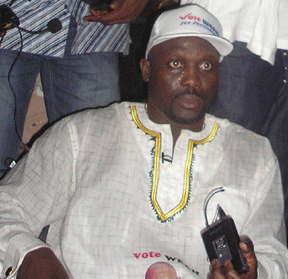 |
|
George Weah
|
|
|
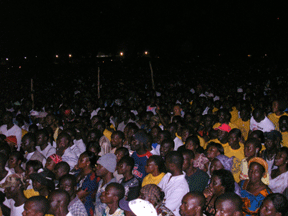 |
|
CDC Launching Campaign
|
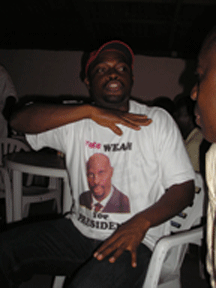 |
|
Weah's Supporter Joseph Wisseh at Czech
Pub
|
Entering the compound was just like getting entering a stadium, with the fans supporting the home team. As we walked towards the stage where Weah harangued his troops, we heard a few rather raw comments thrown at other candidates.
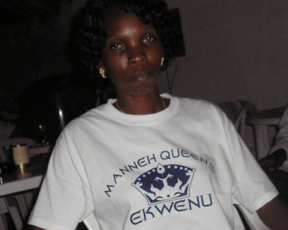 |
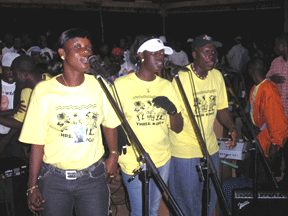 |
Weah was not reading from notes and there was no speech in his hand. It all came out, naturally, in staccato prose, with simple and direct words that brought roars from the crowd. At one point Weah said that he would be president for 8 years. The constitution says 6 years. He corrected himself saying that once elected, he would go back to the constitution and go to the people and limit the tenure to 2 terms of 4. He said that he would practice democracy and the crow screamed. A girl behind me kept pushing me and when I turned, she said she wanted to see the man, not my back.
“The money that your parents spent to send me to Brazil for football camp, that $100,000 and some people say it was a waste, that money made me what I am today. That small investment has bought me respect and fame and money. And I owe you, I owe you something big and that is why I am running for president…”
The crowd was hanging at his every word. Idol, prophet, political leader, rock star, soccer star in an impoverished nation with 85 percent unemployment, George Manneh Weah had found his calling. Politics, soccer, and music, Baccus Matthews had enough material to make a king out of Manneh. Are Liberians ready for it? Can Weah run Liberia? A fan-partisan to whom I posed the question looked at me as if I said the greatest profanity in the world but calmly, the 20-year-old who walked around with his voter registration card hanging around his neck along with a picture of Weah, responded: ”If the majority of Liberians vote for him, that means he can run the country…”
After Weah ended his speech, the fans were informed that they could spend the night on the compound. They were told there would be food and music throughout the night and in the morning they could go back home. Once Weah ended his speech in the midst of crowd chanting “More! More!” the reggae band started a new version of Bob Marley’s War and the political rally turned into a reggae concert.
As we walked to the exit, my friend stopped to snap pictures of the crowd of vendors. All of a sudden, out of nowhere, a young woman stood in front of him and demanded to see some identification. She said she wanted to know which media institution we were from. She said we could not leave the compound unless we told her whom we worked for. She then got on her phone and called a security guard who arrived and started arguing in the same very vocal manner. He said people come and take bad pictures and write derogatory stories about their party and their chairman. He also sent for reinforcements. We were getting surrounded by tens of youth, some demanding that they take the camera from us. I reached for my phone and dialed the number of one the leaders of the party who then spoke to them. Finally, we were let go and a security guard came and told us that he was instructed to make sure that nothing had been taken from us and that nobody harmed us. Later on, Eugene Nagbe, the Secretary General of Weah’s party called us to apologize and ensured that we had not been harmed. In the morning, Weah’s running mate, Rudolph Johnson, called to apologize and ensured that no harm had been done to any of us. It was a bad moment in an exciting evening.
The Weah steamroller is on. Where it will and where it might lead Liberia is all million dollars question that nobody can respond to. A few months ago, we wrote the first article here about the possibility of a Weah presidency. Many thought we were delusional. Even now, many political pundits say that “these are all soccer fans and many of them don’t vote.” But as the young fan at the Czech Pub said, “this is a game of numbers and we can get the numbers.”

